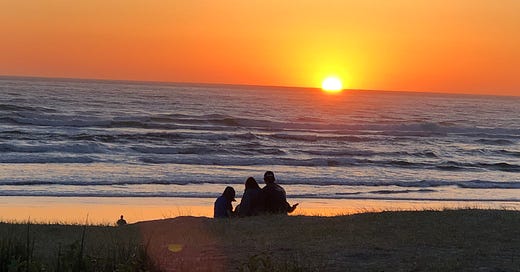At April’s Play Explore Research action, I introduced adrienne maree brown’s emergent strategies as a lens for considering the day’s experiences, participants’ work experiences beyond the gathering, and as a means for identifying how attendees might support each other’s efforts to resist and flourish going forward.
After the session, I asked one of the facilitators about the conversations at her table. She said that she valued the conversation, but apologized that rather than exploring all of the strategies her group had spent the entire time discussing “Less prep, more presence.”
From a point of process, I wasn’t at all concerned about focusing on just one of the strategies. This seems like such a good example of finding the conversation that only these people at this moment can have - another one of the strategies!
I’m not at all surprised that that particular strategy offered so much grist for educators to chew on. I sometimes think it’s ironic to bring that strategy forward given the huge number of hours Susan and I spend preparing our presentations - and I know that’s true of teachers and administrators far and wide. I don’t read that strategy as encouraging a lack of preparation - but that that preparation should lead you to be attentive to all that unfolds.
In her recent interview with Gilbert Cruz, Isabel Allende discusses how writing daily letters to her mother kept her present in a way that, absent the practice, she was not:
“I grew up writing to my mother every single day, because my mother was married to a diplomat, and when I was 16, we separated and we never lived together again. So we got in the habit of writing to each other every single day. I would go through the day noticing what I would write to my mother in the evening. So I was present in the day, taking mental notes of what I was living, I was seeing, I was thinking, I was dreaming, of the conversations, the encounters, so that I would have some material for the evening letter to my mother. She died in 2018. I tried for a while to keep on writing to her as if she was alive, but it didn’t work. It was very artificial. Since then I go through life in a state of daydreaming. I don’t notice anything anymore, because I don’t have to write about it.”
This quality of presence - so different from the measuring stick found in a standardized curriculum, which only asks the teacher to pay attention to how far each student’s response falls from the desired answer - is vigorously alive across the work of Karen Gallas, who we’ve been reading this month in The Studio. Gallas paid attention to life in her classroom, filling her notebooks with observations and reflections, getting curious about what she was noticing, and kept digging deeper. That practice supported the children she was working with to write themselves into their community’s story - and for her to find her way there, too.
I admired that same disposition growing in participants across our Your Stories Matter course this month. The pieces of stories I was privileged to hear grew from the (oftentimes nascent) commitment of participants to honor their attention and curiosity with pen and paper (or keystrokes.) What emerged moved me: amongst many stories I’m still thinking about, I got to hear about a child’s transformation from reluctant writer, to someone who would write to instruct his reader how to drop sprites into Scratch, to an author reflecting on Russia’s war on Ukraine; another participant offered me a window into an administrator reeling from one colleague’s casual dismissal of another, an insensitive act that the author felt she had to respond to - and was trying to figure out how to do so.
Last week, Susan reflected on Ezra Klein’s conversation with Rebecca Winthrop about the purpose of education. In a time of such great confusion and uncertainty - amidst genocide, democratic collapse, and on the edge of an ai tsunami - when we’re all trying to figure how our work might contribute to building the kind of world we want to live in - being present to what is unfolding in our work with children and each other and sharing those stories matters. That presence gives us a foothold to navigate uncertainty within that uncertainty, rather than feeling the need to trade that uncertainty for a product with a reassuring - but veneer of certainty.
We build that foothold through our attention, which we still get to choose - and, as adrienne maree brown tells us, what we pay attention to grows.




